As the clock neared midnight on a beautiful starry night on the coast of southwest Madagascar, eight sets of bemused and weary eyes peered out at us from the dark depths of a seafood collector truck. Our visitors had spent the last 17 hours in this sturdy vehicle to travel the 200km of sandy roads between Toliara and Andavadoaka that had just been ravaged by the recent tropical storm. This was the last, and most adventurous part of their journey, which started on the coast of Northern Mozambique, and brought them here to the Velondriake locally managed marine area to meet and learn from the experiences of the now world-renowned Velondriake committee.
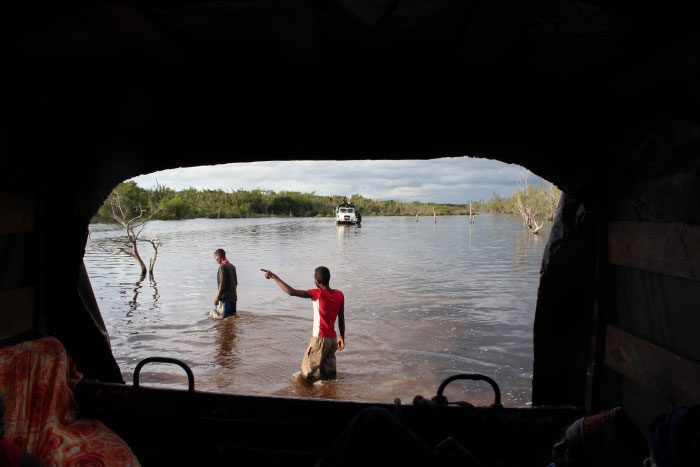
Getting to the coast proved difficult at times! © Jeremy Huet (ZSL)
We’ve seen exchanges between isolated fishing communities to be one of the most effective ways to spark and spread new ideas. The chance to host fishers from far afield, who are fascinated and eager to learn, also keeps motivation up in host communities and builds pride in the progress being made in the face of big challenges.
[Tweet “Exchanges between isolated fishing communities can be effective to spark and spread new ideas.”]
Despite being just on opposite sides of the Mozambique channel, and having similar fisheries and settings, this was the first fisher exchange between Madagascar and Mozambique, and we, the Velondriake team were proud to be hosting our intrepid visitors.
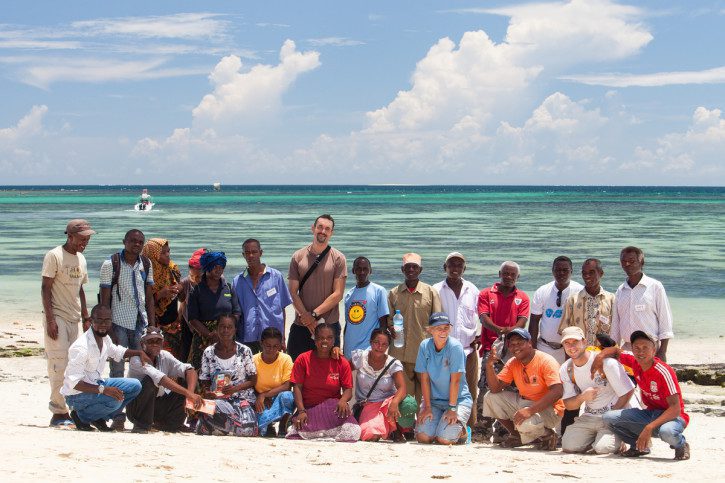
© Blue Ventures / Garth Cripps
Our distinguished guests comprised representatives from two different coastal fishing villages in Northern Mozambique (Quirindi and Quiwia), including an oyster collector (Adija), an octopus trader (Echa), an octopus fisher (Tuaribi) and a village President (Nafassi Fassi). Also taking part were representatives from the organisations supporting these communities to develop fisheries management in Mozambique (ZSL, Bioclimate and AMA).
The coming week was to include a barrage of translations, however we were all relishing the challenge of translating between six languages: Malagasy, French, English, Portuguese, Mwani and Kimakwe. Within minutes of arrival, the charismatic Velondriake Association (VA) President, Mr. Roger, was exchanging warm words of welcome with our guests and trying to work out the similarities between the different languages.
The next few days took in tours of the village of Andavadoaka, octopus gleaning, discussions with octopus sellers and data collectors, discussions about the Velondriake committee’s story, efforts to increase women’s participation in management decision making, and visits to the aquaculture site to meet fishers turned seaweed farmers. The Velondriake committee organised presentations, excursions, meetings… but it was often the one-on-one discussions that were particularly enlightening.
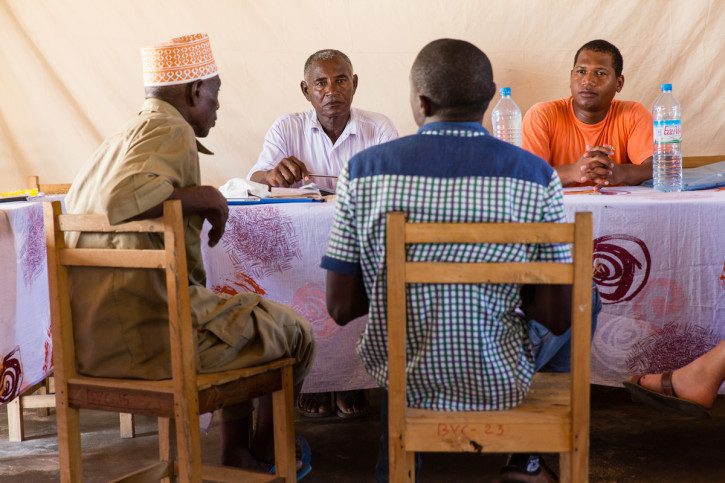
Discussions took place around set presentations and more informally during the visit © Blue Ventures / Garth Cripps
“How do you decide when to close the octopus reserves?” “How on earth do you police them?”
The Velondriake association members highlighted many aspects of their experiences, including how temporary octopus closures had increased awareness of conservation potential and paved the way towards achieving both a cohesive committee of representatives from 24 villages, and a network of reef and mangrove permanent reserves. Our visitors’ enthusiasm to bring back lessons they could apply themselves was clear in the stream of pertinent questions: “how do you decide when to close the octopus reserves?”, “how on earth do you police them?”.
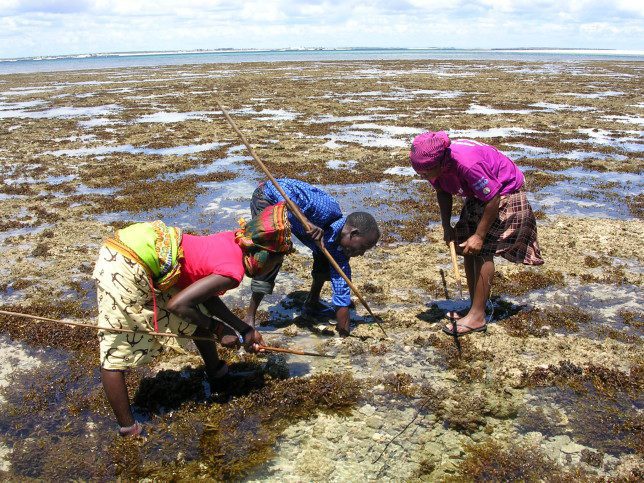
Members of the exchange learn Malagasy octopus gleaning techniques © Blue Ventures / Xavier Vincke
A gleaning trip to Velondriake’s first temporary octopus reserve, Nosy Fasy, showed our Mozambican guests on a practical level, what kind of areas are closed every year throughout Velondriake. Hunting octopus together led to many discussions about the different methods and traditions in place on each side of the channel.
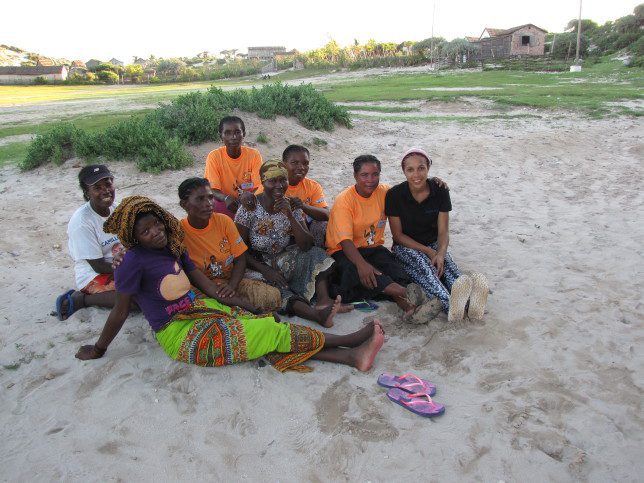
© Julio Ernesto (AMA)
The passion and enthusiasm of the Velondriake Committee, and in particular the very vocal women of the group, appeared infectious as within two days, even Adija, a young, very serious oyster collector from Quiwia, was smiling, laughing and even speaking before men in the meetings. This came as a very pleasant surprise to our guests who asserted that this was indeed a rare event. Where women in Velondriake are certainly under-represented in management and often shy to express opinions in front of male dominated delegations, we learned that in Quiwia specifically, this timidity runs extremely deep in society, so this sudden change in behaviour was quite impressive.
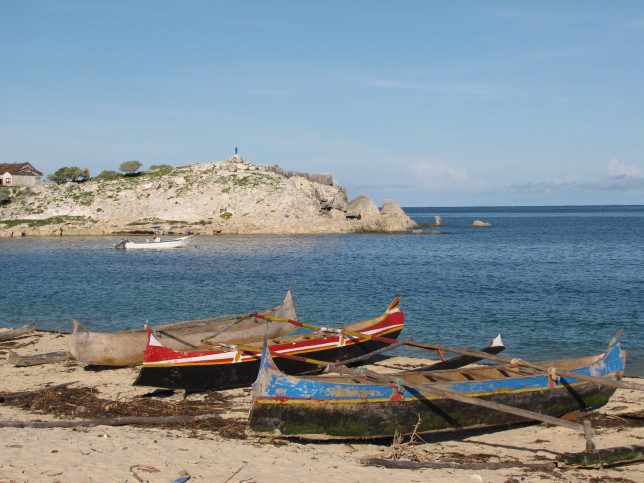
© Adaoma Wosu (Bioclimate)
The beauty of community exchanges is that both visitors and hosts are constantly learning from the other. The beauty of community exchanges is that both visitors and hosts are constantly learning from the other. One walk along the beach and witnessing the problem of open defecation in Andavadoaka was particularly shocking for our Mozambican visitors. It was clear that we could learn a lot from the Mozambique experience of how to tackle this through community-led sanitation.
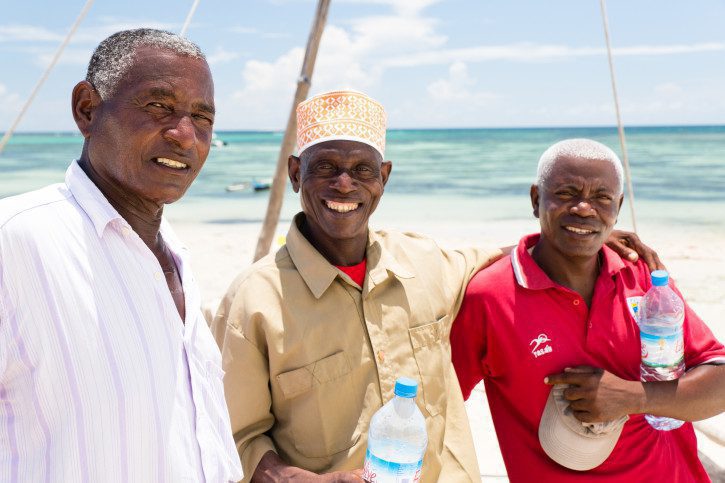
© Blue Ventures / Garth Cripps
“It is always important to be self-critical in a constructive way…”Exchange trips are not just the moment to share successes; a lot can be learnt by discussing the many challenges faced in developing community-led marine management. “It is always important to be self-critical in a constructive way…” stated Mr.Roger during our preparation for this visit, “and look at ways in which Velondriake needs to improve and how Mozambique can learn from that.” Some of the issues discussed during the trip included the constant need for education and awareness raising throughout communities, the importance of including communities at all stages of consultation and decision making in order to generate sustainable support for activities, and trying to cope with migrant fishers that are not always aware of the local laws governing Velondriake.
When delivering final words of advice before the team’s departure, the message from the Velondriake committee was clear and powerful: “Don’t ever be discouraged; there will always be people that don’t agree with what you propose, but you must remain positive and keep going – this work is really important and eventually you will get everyone on board.”
Good luck Mozambique team – we hope to hear great things from your efforts in the future!

